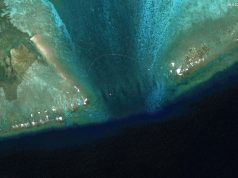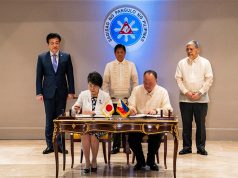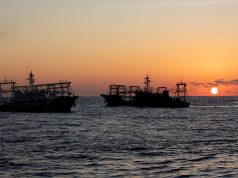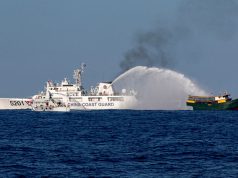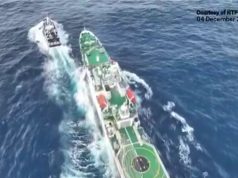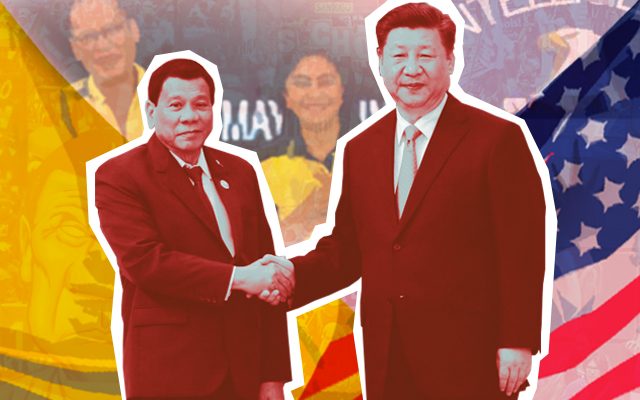
President Rodrigo Duterte’s recent remark that China will back him up in case he gets ousted from the presidency may be surprising, but it was not the first time the government hinted at “destabilization” plots led either by the political opposition, the United States or left-leaning organizations.
“The assurances of [President] Xi Jinping were very encouraging. Eh, they are there. ‘We will not allow you to be taken out from your office, and we will not allow the Philippines to go to the dogs,'” Duterte said as he quoted Jinping.
The statement was met with ire by some senators, particularly Sen. Ping Lacson:
“God help the Philippines, because we are a sovereign country and only the Filipinos can determine or decide what they want to do and not any foreigner or foreign country.”
Rumors of destabilization
Despite his popularity, the tough-talking Duterte has repeatedly claimed there are plans to have him removed from office.
September 2016
Communications Secretary Martin Andanar claimed there are destabilization plots against the president:
“We take any destabilization moves seriously, whether it’s a rumor or A1 information; it is against the law. It’s inciting to rebellion and this has happened in the past.”
He added that the Palace has received information from “credible sources in the United States” but has refused to mention names.
Apparently, a Cabinet member told Andanar that some Filipino-Americans allegedly wanted Duterte out of office by January 2017.
AFP Public Affairs Office Chief Col. Edgard Arevalo disproved the issue, saying the military has not monitored any form of direct threats at all.
The military debunked the claims, saying no threats on the president or his position have been monitored.
The military debunked the claims, saying no threats on the president have been monitored.
October 2016
Yves Akol, the secretary general of PDP-Laban in Negros Island Region, reportedly outlined a plot against Duterte through Facebook.
This prompted him to issue an apology to Negros Occidental governor Rafael Coscolluela.
Akol wrote:
“I may not be a fan of the president, and I am critical of his language and his methods, but I will be the first to discourage any deviation from democratic processes to achieve any end.”
December 2016
Rumors swirled that former US Ambassador to the Philippines Philip Goldberg prepared a blueprint to oust Duterte.
It came from a news report that quoted an alleged leaked document of “a strategic recommendation ostensibly to the State Department for the ultimate removal of President Rodrigo Roa Duterte from office.”
House Speaker Pantaleon Alvarez called for it to be investigated, even as the US Embassy has denied the existence of such a blueprint.
Interestingly, the rumors broke around the time the US was expressing concern over Duterte’s bloody anti-narcotics campaign.

January 2017
Vice President Leni Robredo was accused of being involved in a controversial email thread supposedly involving people planning to oust Duterte.
It was tagged “Leni Leaks,” where her staff reportedly incited her supporters through a Yahoo! Group. Robredo heavily denied the claims and said it was a “malicious” accusation.
Her spokesperson Georgina Hernandez noted that Robredo was not even part of the thread, which was publicly available online.
February 2017
Kilusang Pagbabago, a new party formed in 2016 to “protect” the president, called out the Liberal Party and its supporters for plotting against Duterte.
The group claimed LP is “backed by big business, big landlords and the big financiers of organized illegal drugs and criminal syndicates.”
Former President Benigno Aquino III dismissed the rumors as pure “kalokohan.”
March 2017
Duterte accused some mining executives of funding people to destabilize him:
“When it comes to the preservation of my country, the land… I will do what is necessary. I know that some of you are giving funding to the other side to destabilize me.”
The Chamber of Mines of the Philippines clarified that it is not aware of such actions by mining companies and executives.
September 2017
The Palace announced that it is probing the destabilization attempts supposedly planned by the opposition Liberal Party.
Defeated senatorial candidate Greco Belgica, whom Duterte subsequently appointed to an anti-corruption body, said:
“They (the Liberal Party) want to put Leni Robredo in power and evade criminal liabilities. We don’t want that to happen so we should not allow it.”
Even presidential spokesperson Ernesto Abella said Belgica needed to provide “substantial evidence” but added they were looking into it.
October 2017
Duterte accused the LP anew of conspiring with the Communist Party of the Philippines to oust him:
“But what is really very clear is ‘yung Left, pati ang kaalyado ng Left… ‘yung mga dilaw. Gusto nila ako paalisin dito sa Malacañang.”
He eventually warned that he would form a “revolutionary government” if the attempts persist.
He said in an interview, “‘Pag ang destabilization ninyo patagilid na at medyo magulo na. I will not hesitate to declare a revolutionary government until the end of my term.”

The president added that he would go on a “full-scale war” against the New People’s Army. He also claimed that the armed forces know the Communist Party of the Philippines is behind the ouster efforts.
Opposition coalition Tindig Pilipinas called him a “paranoid and insecure little man afraid of losing power.”
Later that month, US Ambassador to the Philippines Sung Kim dismissed claims that the Central Intelligence Agency was devising a scheme to depose Duterte, following up the rumors back in December 2016.
“As far as I know, there is absolutely no effort by the CIA to undermine the Philippine leadership,” the ambassador said.
February 2018
Lawyer Jude Sabio, who filed accusations against Duterte before the International Criminal Court, also denied making the move to kick out the president.
He said, “Walang intensyon dito na i-overthrow si President Duterte, but if ever he will have to be overthrown, mas maganda ‘yun para mas madala siya sa Hague.”
Sabio added that Duterte has no one to blame but himself if the international court rules against him.
“Ngayon kung may gulong mangyari, kung may destabilization man o ma-overthrow man si Pangulong Duterte, kasalanan ni Pangulong Duterte ‘yan dahil siya mismo ang may pakana, ang mastermind ng sistema ng death squad killings mula pa noong Davao,” he said.
Prior to becoming president, Duterte served as Davao City local executive for two decades.
May 2018
Duterte announced that Chinese leader Xi Jinping assured him that Beijing would not let him be removed from office, much to the public’s disbelief.
Destabilization or criticism?
Recently, presidential spokesperson Harry Roque explained that Duterte’s remark about Xi could be in the context of possible moves by “Westerners” to oust him.
“Bagamat dito sa Pilipinas napakalaki ng suporta niya ay may mga talagang mga kumakalaban sa kanyang mga dayuhan lalong lalo na ‘yung mga ‘Westerners.”
“Ang konteksto noon siguro eh kung talagang magtatangka ang mga kaputian na iyan na patalsikin siya sa pwesto, eh maasahan niya ang mga kaalyado niya sa Asya na tutulong,” he continued.
Roque referred to Duterte’s so-called Asian “allies,” even as the United States is the Philippines’ only defense ally.
Sen. Antonio Trillanes IV, a Duterte critic, rebutted that Duterte was only “destabilizing himself.”
“No one is trying to kick him out; he is doing the destabilizing all by himself.”
Defense Secretary Delfin Lorenzana, who has repeatedly been asked to confirm the supposed plots, clarified:
“On alleged destabilization, we don’t have that information in the Armed Forces, that’s zero actually. Now sometimes there are violent reactions, criticisms to the president. Criticism to the president is not destabilization. In the military, intelligence community there is none.”
The president has been highly criticized by 39 countries in the United Nations due to his stance on extrajudicial killings. The European Parliament similarly decried the killings and called for the administration to end the brutal campaign.
The criticisms also came in protests by various sectors who march into the streets a few times during Duterte’s presidency over his policies such as the burial of dictator Ferdinand Marcos at the Heroes’ Cemetery and the deadly war on drugs, among others.
Sen. Ping Lacson highlighted the impact of the protests, saying “a protest is a protest that any leader should take account of and not simply dismiss as noise.”
“History of failed leaderships anywhere in the world tells us that the voice of dissent almost always start with few and insignificant numbers,” he said. — Art by Uela Badayos




